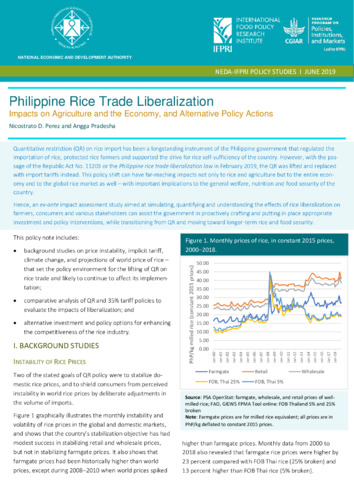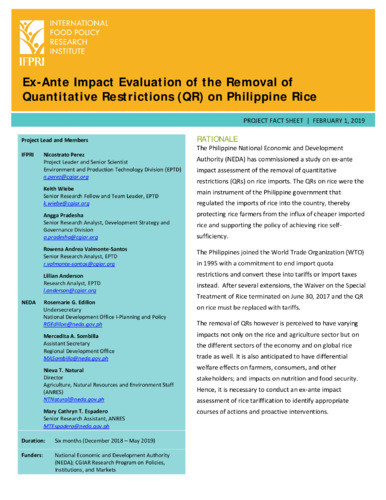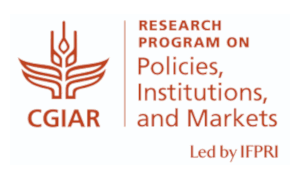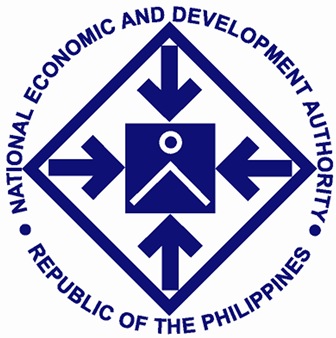The primary objective of the Evaluation of quantitative restrictions (QR) on Philippine rice project is to simulate and analyze the impacts of lifting quantitative restrictions (QR) on rice imports on the Philippine agriculture sector and to the economy. The study evaluated a 35 percent tariff policy scenario in lieu of the QR, with a primary focus on:
- nutrition and food security objectives of the Philippine government;
- welfare of rice producers and consumers;
- effects on the competitiveness of the rice industry and the agriculture sector; and
- economy-wide impacts on gross domestic product, household income, employment, and wages.
- Secondary objectives include:
-
- developing investment strategies for enhancing the competitiveness of the rice industry with the removal of QR; and
- simulating the impact and effectiveness of the proposed Rice Tariffication Enhancement Fund (RCEF) to be generated from rice import tariffs in boosting farmers’ productivity, competitiveness and income.
- Rationale and Project Information
-
The Philippine National Economic and Development Authority (NEDA) commissioned a study on ex-ante impact assessment of the removal of quantitative restrictions (QRs) on rice imports. The QRs on rice were the main instrument of the Philippine government that regulated the imports of rice into the country, thereby protecting rice farmers from the influx of cheaper imported rice and supporting the policy of achieving rice self-sufficiency.
The Philippines joined the World Trade Organization (WTO) in 1995 with a commitment to end import quota restrictions and convert these into tariffs or import taxes instead. After several extensions, the Waiver on the Special Treatment of Rice terminated on June 30, 2017 and the QR on rice must be replaced with tariffs.
The removal of QRs however is perceived to have varying impacts not only on the rice and agriculture sector but on the different sectors of the economy and on global rice trade as well. It is also anticipated to have differential welfare effects on farmers, consumers, and other stakeholders; and impacts on nutrition and food security. Hence, it is necessary to conduct an ex-ante impact assessment of rice tariffication to identify appropriate courses of actions and proactive interventions.
NEDA commissioned the International Food Policy Research Institute (IFPRI) to conduct this study. IFPRI has the technical expertise and experience in the usage of analytical models and tools well-suited for this type of assessments and analyses, including the application of the global and Philippine-calibrated versions of the International Model for Policy Analysis of Agricultural Commodities and Trade (IMPACT) and a computable general equilibrium (CGE) model of the Philippines.
The results of the study were presented in a policy forum convened by NEDA in May 2019, with participation from concerned government agencies, private sector, and civil society.











